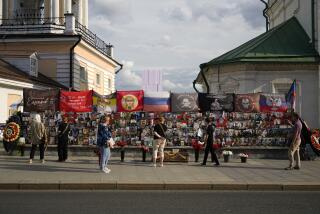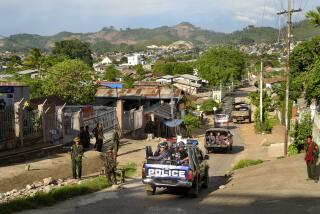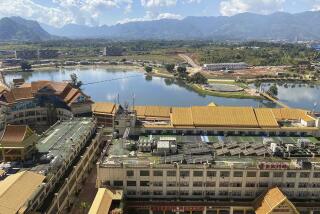Islamist rebels move into central Mali in new clashes with army
Islamist rebels say they took a strategic city in central Mali on Thursday amid fresh clashes with government forces, extending their reach in the divided country.
Battles that began Wednesday marked the first fighting between military forces and Islamists since the rebel takeover of northern Mali last spring. Until Thursdayâs advance the rebels had held only the north, far from the seat of government power in the south.
Government forces lost control of the central city of Konna on Thursday, Ansar Dine spokesman Sanda Abu Mohammed told the Associated Press. The reported advance by the rebels is a serious blow to the army, threatening a nearby military airport and throwing into question whether Malian forces can protect areas farther south if the rebels press onward.
âHow far are the rebels willing to go?â asked Michael Shurkin, a political scientist with Rand Corp., a think tank. Making a run at the capital, Bamako, no longer seems out of the question, he said. âAs long as they go south, they demonstrate the weakness of the Malian state to defend itself.â
Religious extremists have controlled northern Mali for about nine months, seizing on the territorial gains made by Tuareg rebels in the aftermath of a military coup. The extremistsâ ties to Al Qaeda have alarmed neighboring countries and the West, but the United Nations Security Council has insisted that the fractured country must take steps toward political stability and refine its plans before international troops are deployed.
The outbreak of fighting this week follows the collapse of a December cease-fire with Ansar Dine, one of the Islamist groups commanding the north, and casts a pall over peace talks, which were supposed to begin Thursday in Burkina Faso.
The rebels may have pushed south in a calculated attempt to get the upper hand in those talks, but it is also possible that government troops pushed north to show they were ready to fight, said Comfort Ero, who oversees Africa programs for the International Crisis Group.
âThe future fate of Mali is now on the knifeâs edge,â Ero said in a Skype interview from Kenya. âThis undermines any room for negotiations with the armed groups.â
Peace talks have since been rescheduled for later this month. International forces are not expected to deploy until at least the fall, but the rebel gains could pile more pressure on the U.N. and Western powers to act quickly. France called Thursday for urgent deployment of international troops to stop the rebels.
âThis is going to increase the tensions between France and the U.S.â over when to act, said Susanna Wing, associate professor of political science at Haverford College. âThe U.S. might rethink its position about going more slowly and focusing on elections.â
Experts cautioned, however, that pushing back the rebels with military force will not be enough. Mali still needs to address the disenfranchisement at the root of the Tuareg rebellion and reestablish order in its troubled government, where the military continues to wield control behind the scenes, experts say. A rush to act after the eruption of fighting could undermine those badly needed steps.
âMy fear is that the pressure to act with urgency will lead to a solution that isnât properly prepared,â said William Assanvo of the African Diplomacy Observatory based in Ivory Coast. âProper resources, a stable political authority in Bamako -- all of this will inevitably require some time.â
Shurkin also says the international military effort to deploy West African troops, backed by Western air power, could radicalize the people of northern Mali or foster a ârace warâ between the lighter-skinned Tuareg and the darker population in the south. A better plan would be to identify northern allies, including Tuareg factions, and arm them to work against the radicals, Shurkin said.
âBut it would require care and some work,â not a rush to act, he said.
As the crisis wears on, turmoil has continued to roil the south as well. Protests broke out Wednesday in Bamako and the nearby town of Kati, driven by politicians who propelled the coup last year, Agence France-Presse reported. As protesters called for the interim president to step down and demanded the liberation of the north, the government reacted by closing schools in both towns.
âThereâs a fair number of people who would like to get a legitimate government in the south before making a push to take back the north,â said William Moseley, a geography professor at Macalester College. âBut if the ânorthâ is expanding, that complicates things.â
ALSO:
Three female Kurdish activists slain in Paris
Bomb blasts across Pakistan kill 104 people
Russia says child adoption deal with U.S. is valid until 2014
More to Read
Sign up for Essential California
The most important California stories and recommendations in your inbox every morning.
You may occasionally receive promotional content from the Los Angeles Times.










